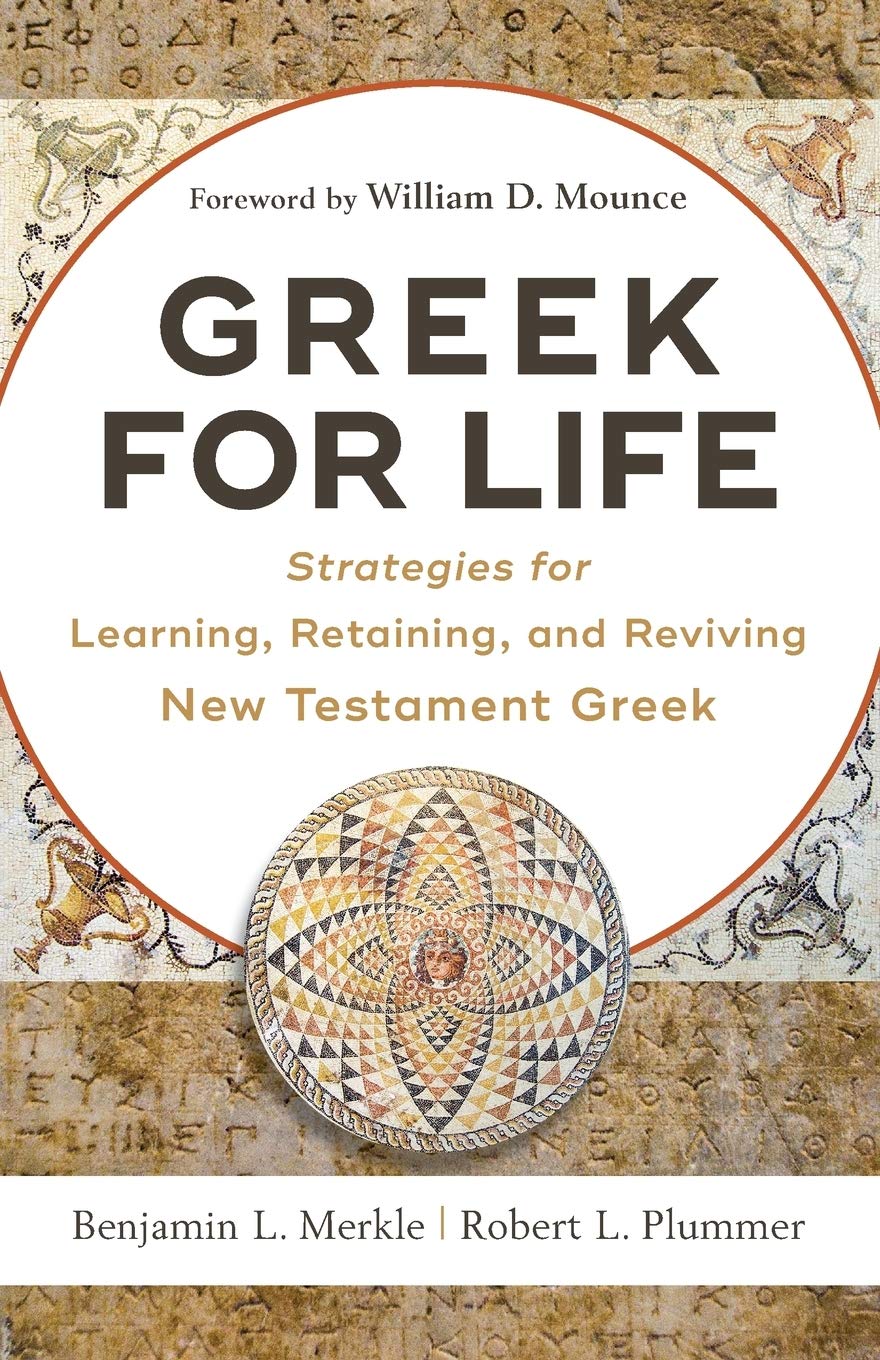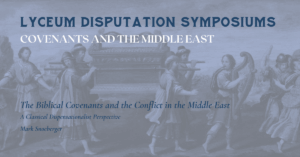Merkle, Benjamin L. and Robert L. Plummer. Greek for Life: Strategies for Learning, Retaining, and Reviving New Testament Greek. Grand Rapids, Michigan: Baker Academic, 2017. 176 pages. Softcover. ISBN: 9780801093203. $21.99
When I started seminary, I was eager to jump directly into the study of the Greek language. I anticipated that it would give me the secret code to devastating my theological enemies. As it turns out, it was a humbling experience, which helped me to understand just how complicated and multidisciplinary Bible translation, biblical studies, and theological reasoning are.
In learning an ancient language, I realized I didn’t really know my own language very well. I needed to learn not just the alphabet and vocabulary of the Greek language itself, but also how languages in general work. I had to learn syntactical categories that I had never encountered in English, along with terms like semantic range or discourse analysis. In the end, I learned a lot of Greek, and I had a new appreciation for the wealth of scholarship contained in so many faithful English translations of the Bible.
In class, I heard the terrible stories of seminary students who almost immediately lost their Greek skills after graduation, and I swore that I would not be one of them. Yet here I am, several years out of seminary with my Greek disappearing by the day (and please don’t ask me about my Hebrew!). A year or so ago, I agreed to teach a section of biblical Greek to a home school group, mainly for the voluntary pressure of having to resharpen my Greek for myself, and it has been a surprising encouragement to me in ministry.
Early in the process of recovering my own Greek, I picked up Ben Merkle and Rob Plummer’s little book, Greek for Life. This book was the stimulus the Lord used to inspire me to regain and maintain my Greek language skills, and I heartily commend it to anyone working closely with the biblical text, especially pastors.
The book is comprised of eight short chapters addressing different objections and strategies for “learning, retaining, and reviving New Testament Greek.” At the end of each chapter are reflection questions that cement what was taught and require action steps for proceeding. Also, following each chapter’s reflection questions is a devotional insight from various authors, showing how their knowledge of Greek has given helpful insight that they would not have had with just the English translation.
The authors begin by explaining that “The study of Greek is not an end in itself. The end goal of studying Greek is to know the God who has revealed himself through his Word…The goal of learning Greek is first and foremost born out of a desire to behold unhindered the grandest sight: God himself” (2-3). Then they address several reasons why someone should study Greek, as well as several objections that might hinder someone from studying the language.
Along the way they draw on insights from modern psychology and memory studies to highlight some of the challenges of maintaining an ancient language, and they also use these insights to help the diligent reader to develop a plan for success in their Greek study, with a big emphasis on review, daily readings from the Greek New Testament, and helpful pointers to resources to reinforce and deepen Greek knowledge.
Another useful aspect of the book is how it handles the developments of Bible study software. With tools like Logos Bible software, Accordance, and Biblearc, etc., it can be easy to think that your Greek is actually better than it is (87). While they are certainly not opposed to these developments in technology, they insist that looking at the Greek text of Scripture, without assistance being too easily available, leads to greater learning and retention. They write, “Only by doing this actual thinking and wrestling for yourself will syntactical categories become part of your own mental database. I tell my students to be like Jacob wrestling the angel at Peniel. Grab hold of that Greek word or phrase and don’t let go. Cry out, “I will not let you go until you bless me!” (98).
What makes the book so helpful and engaging is the conversational style of the writing and how the authors demonstrate that they understand the real reasons why people fail to keep their Greek. For example, the authors force you to face the facts about where your Greek skill level truly is, as well as what sort of time you actually have to improve it. They suggest several tips for how to prioritize relearning and maintaining Greek, from useful phone apps, to minimizing distractions, to accountability structures.
They ask: “How long has your Greek been inactive? Ten days? Ten years? You may feel like Ezekiel, looking out over a valley of dry bones. ‘Can this Greek live?’” (123). After reading this book, you cannot help but feel hopeful and resolved that you really can improve your Greek. Do not let shame or regret keep you from pursuing what would be good for your soul and for the souls of those to whom you minister God’s word.
After reading the book, I started a “Greek for Life group” in the town where I live, and I invited a dozen pastors from nearby churches, and now once a month we meet together and walk through a few paragraphs of the Greek text, parsing keywords and talking about the syntax. I send the passage out weeks ahead of time so that when we gather together, we can all contribute to the discussion with questions and insights.
Whether you could form a group like that or not, you can and should study Greek. Let me leave you with this quote from Luther, in his characteristic lack of restraint:
“Since it becomes Christians then to make good use of the Holy Scriptures as their one and only book and it is a sin and a shame not to know our own book or to understand the speech and words of our God, it is a still greater sin and loss that we do not study languages, especially in these days when God is offering and giving us men and books and every facility and inducement to this study, and desires his Bible to be an open book. O happy the dear fathers would have been if they had our opportunity to study the languages and come thus prepared to the Holy Scriptures! What great toil and effort it cost them to gather up a few crumbs, while we with half the labor—yes, almost without any labor at all—can acquire the whole loaf! O how their effort puts our indolence to shame! Yes, how sternly God will judge our lethargy and ingratitude!” (15)
We have an amazing privilege and stewardship to use our theological education for powerful service to the people of God. That’s just as true in your initial education as it is in your maintenance of what you learned way back then.
Editors Note: The London Lyceum confesses the 2LCF. If the content of the book rejects the 2LCF at any point, we find reasons for concern and the need for revision. However, it is not the mission of the London Lyceum to always publish work that agrees with our confession of faith. We seek to generate thinking and foster an intellectual culture of charity, curiosity, critical thinking, and cheerful confessionalism.
Author
-

Garrett Walden (ThM, The Southern Baptist Theological Seminary) is General Editor for Particular Baptist Heritage Books, in addition to serving as an editor for The London Lyceum and Hanover Press. He's also a farmer in Alabama with his wife and five kids, where he continues to serve his church and research early Baptist history and theology.
View all postsRecent Posts




